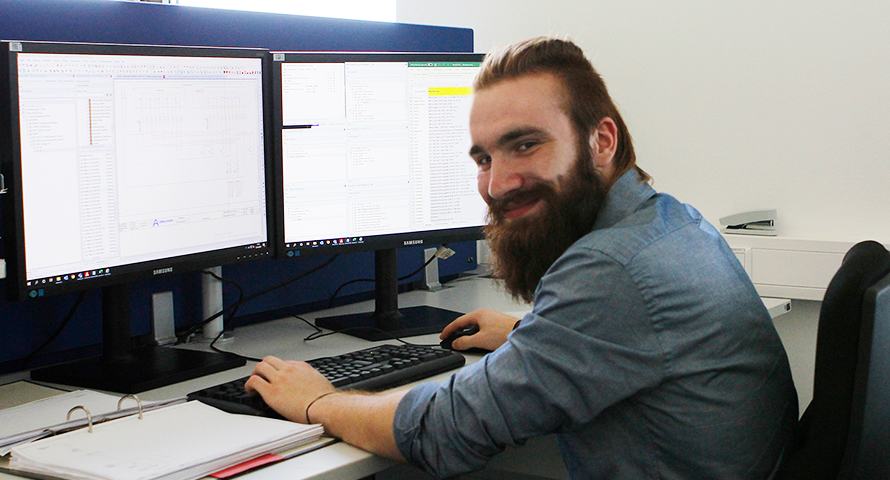Why did you choose the dual study Bachelor of Engineering - Electrical Engineering / Information Technology?
By studying in a practical combination, I can expand my practical skills in addition to the theoretical knowledge I acquire at university. Now, I can always fall back on this in my professional life. The practical work and experience gained during training are definitely helpful as an engineer. Another aspect that speaks in favour of a dual course of study is of course the remuneration, which is lacking in a normal course of study.
Are special previous knowledge and skills required for this profession?
Since the HAWK study program is not yet admission restricted, only the university entrance qualification is mandatory. A pronounced interest in electronics and electrical engineering should already be present, as well as in math and general physics.
Why did you choose ONEJOON as your employer?
I thought the project business of which ONEJOON is working for could be very interesting; I wanted to have more variety than in series production. In addition, the location was convenient and after my first visit, the labor environment was very friendly.
What do you particularly like about training at ONEJOON?
In the production department, I particularly liked working actively on products that are sold instead of constantly making practice pieces. This gives you the feeling that you are really making something. It is also great that you get your own tool, so you do not have to share it with others and know that it will work if you handle it well. What stands out most in the Electrical Construction is the independence with which you work here. If you show that you are doing good work, you will get back praise and trust. In general, the friendly labor environment and the interesting projects are also worth mentioning.
Which departments do you visit during your training?
I spent the first two years of my training in the production department, in the switch cabinet construction department. I also completed my training there during my basic studies (i.e. the first two semesters). After passing the final examination, my workplace moved to the Electrical Design department, where I now only work during the semester breaks.
What does your typical working day look like and what are the working hours?
As we have flexitime, I can start my day flexibly between 06:00 and 07:00 o'clock. By the way, this is the case in both departments, so you do not have to get used to it. If I used to take my tool trolley and go to my current workplace, I now sit down in front of my desk and start my work there. The nice thing about our working time model is that we have a short Friday and, provided you were there at 06:00 o'clock, you get off work on Friday at 12:15 o'clock.
How is the cooperation with trainers and colleagues?
In general, the cooperation with colleagues is very pleasant here. You support each other and always find a solution for every problem. The trainers are friendly, it is not assumed that you can do everything at once. Mistakes are tolerated and help is given in solving them.
How are the lectures at the university organized and what is the content of the lectures?
The first two semesters are extended to a total of four semesters, which you complete during your studies. This means that you usually spend two days a week at the university and the rest at work. After completing the first four semesters and thus also after completing the training, you continue as a full-time student. That means every day of the week at the university and only during the semester breaks at the company. In the basic studies you go through many general things, this is because the basic studies for electrical engineering/information technology as well as for precision mechanical engineering and physical technologies are the same. Thus, one also deals with non-electrical subjects such as kinematics, technical mechanics or materials science. After the basic studies it becomes much more specific and covers topics such as communication technology, measurement technology and signal processing. There are then also interesting additional courses such as circuit board design or energy and environment.
Which software do you work with?
In the design department I work with EPLAN, an incredibly comprehensive and sophisticated software for creating circuit diagrams. It is fun to work with, because if you define components correctly, the software generates secondary things like terminal diagrams and bills of materials completely by itself. So you can concentrate on the essentials alone. An immense advantage over graduates of a normal course of study is that this means that I am already well-versed in the use of EPLAN. Since many companies use this software, this is a strong advantage on the job market.
What career opportunities do you have after your studies?
After my engineering studies in electrical engineering/information technology, I can actually get a job in any industrial company. Technology is something that never becomes unimportant, so you are definitely covered. You can also specialize further and get a master's degree.
Can you put your theoretical knowledge from university into practice?
Definitely yes, during your studies you learn a lot of background information and specialist knowledge, which are indispensable tools in your profession. But of course, you also learn things that you might not need later on. But these are so interesting that you should not be bothered by that.




